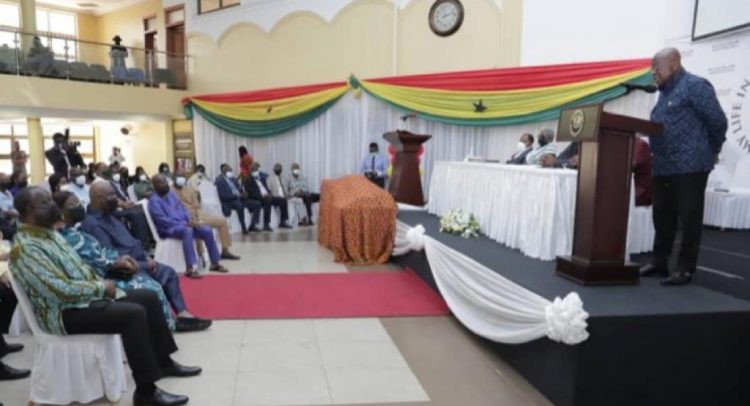President Akufo-Addo has paid glowing tribute to the late lawyer and politician of UP stock, Bernard Joao da Rocha.
B.J da Rocha was popularly known as a founding father and the First National Chairman of the New Patriotic Party (NPP) that he leads today and was also the first Ghanaian Director of the Ghana School of Law when it was opened in 1958.
He served as the General Secretary of the Progress Party led by Dr. Kofi Abrefa Busia.
He died on February 23, 2010.
At a book launch in Accra to honour his memory on Wednesday, March 2, 2022, President Akufo-Addo described the man as a role model for young lawyers in Ghana.
The book entitled “Memoirs and biography: My Life in Law and Politics”, was written by da Rocha and Ayodele Kingsley-Nyinah.
The President also described the late NPP stalwart as a formidable figure in the foundation of the Danquah-Dombo-Busia political tradition who impacted the history of Ghana.
The book was put together by da Rocha’s daughters.
The President said da Rocha’s decision to be a lawyer and a politician at the same time had a major impact on the country’s history, describing him as an outstanding advocate of his generation.
He said da Rocha’s love for arguments and his passionate views on issues, his love for freedom, and his attitude of not bearing grudges, was the most refreshing aspect of his personality.
He recalled several interventions in law made by the advocacy of da Rocha’s skill, citing his work defending Tawiah Adamafio and others as a good example of legal defence in Ghana.
He, therefore, noted that the history of Ghana’s 4th Republic would be impossible to write without BJ da Rocha, saying he was a better example of a role model for young lawyers.
That, he said was partly because da Rocha spoke his mind without fear or favour and was a courageous man of forthright views who was scornful of “stomach politicians”.
He referred to the NPP’s decision to boycott the 1992 parliamentary elections which da Rocha opposed, with the very strong view that a political party worth its salt would have no future without representation in the legislative arm of government, but had to, in the end, accept the majority vote of the party, which later led to reforms in the party.
President Akufo-Addo thus noted that there is so much significance in the book for the party to learn from.
He was full of praises for da Rocha’s daughters for keeping his memory alive and encouraged Ghanaians, particularly history students, to get a copy of the book.
A former minister of state, Elizabeth Ohene in her remarks said da Rocha’s death has left a huge vacuum, which has not been filled.
She found da Rocha’s interaction with the local media very interesting and highlighted the flaws of the local media in the historical accounts of media freedom in Ghana.
She also recommended the book as a must-read material.
Joe Ghartey, a Ghanaian lawyer, academic, and politician, who reviewed the book, noted that the period of da Rocha was significant to students of law, because his hard work, determination, among others were characteristics that should be emulated.
The legal luminary, he said, authored some textbooks in law which are still the most sought-after materials in the profession, saying, “no wonder he was one of the leading lawyers in their time.”
He said the book rendered a historical account of Ghana’s democratic progress from post-colonial democracy to present-day constitutional rule.
By Charles Takyi-Boadu, Presidential Correspondent


